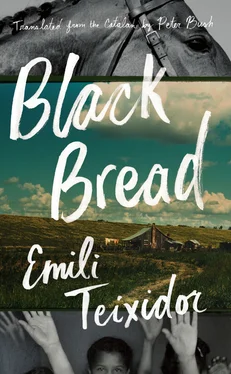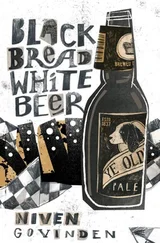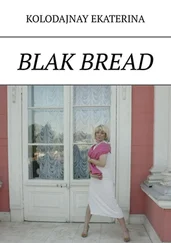Emili Teixidor - Black Bread
Здесь есть возможность читать онлайн «Emili Teixidor - Black Bread» весь текст электронной книги совершенно бесплатно (целиком полную версию без сокращений). В некоторых случаях можно слушать аудио, скачать через торрент в формате fb2 и присутствует краткое содержание. Год выпуска: 2016, Издательство: Biblioasis, Жанр: Современная проза, на английском языке. Описание произведения, (предисловие) а так же отзывы посетителей доступны на портале библиотеки ЛибКат.
- Название:Black Bread
- Автор:
- Издательство:Biblioasis
- Жанр:
- Год:2016
- ISBN:нет данных
- Рейтинг книги:3 / 5. Голосов: 1
-
Избранное:Добавить в избранное
- Отзывы:
-
Ваша оценка:
- 60
- 1
- 2
- 3
- 4
- 5
Black Bread: краткое содержание, описание и аннотация
Предлагаем к чтению аннотацию, описание, краткое содержание или предисловие (зависит от того, что написал сам автор книги «Black Bread»). Если вы не нашли необходимую информацию о книге — напишите в комментариях, мы постараемся отыскать её.
Born in 1933,
's first novel,
, was published to tremendous acclaim in 1988, followed by several more which established him as one of Spain's greatest contemporary authors.
Black Bread — читать онлайн бесплатно полную книгу (весь текст) целиком
Ниже представлен текст книги, разбитый по страницам. Система сохранения места последней прочитанной страницы, позволяет с удобством читать онлайн бесплатно книгу «Black Bread», без необходимости каждый раз заново искать на чём Вы остановились. Поставьте закладку, и сможете в любой момент перейти на страницу, на которой закончили чтение.
Интервал:
Закладка:
In our refuge at the top of the plum tree, we’d keep quiet while the front of the house became a distant hubbub that might focus on us at any moment. We watched darkness advance through the woods, until Cry-Baby said: “We’ll never be able to see how the colours are born. Grandmother told me. So now I know.”
“And what fairy story did Grandmother tell you?” retorted Quirze nastily.
“That it’s like dreaming, we only remember dreams when they come to an end, if we wake up in time, but never how they began or how long they lasted. And if we don’t wake up in time, we only remember for a few seconds when we get up before it’s gone forever.”
Quirze said nothing, landed a gob of spit on the ground and went on: “It’s not the same at all! You must sleep to dream, and if you want to see a leaf change colour, you must be wide awake and keep your eyes on the same spot. It’s completely different. That’s what she reckons. Anyhow I never dream.”
We knew the wood’s changing colours were the signal for us to leave the plum tree and seek shelter in the winter house, the stone and plaster house, the hard, shut-up house, the opposite to our cool, airy, open, rustling home among the trees. We abandoned the fruit orchard like refugees making their way to an unknown land. The world of adults, grown-ups, or rogues, rascals and rapscallions, as Grandmother and Father Tafalla called them, and their obligations, squabbles and disagreements, particularly of the men who lorded it over everything with their coarseness, their filth, their clogs and their sullenness. The world of women was more fun, but it wasn’t independent, it always revolved around men: their meals, drinks, clothes, mending, changes of clothes and mind, moods, orders, guests, friends, cleanliness and silences… Women never had time for themselves, they couldn’t stop whirling in the orbit of men the whole day long, preparing for when they arrived, left, were absent or needed something… For the odd moment, on the odd day, a space opened up when two or three women came together to rest, a few minutes mid-morning, a short break mid-afternoon, or at night, when the men went out after supper or went upstairs to bed and left the women and children alone, and then you heard sighs, giggles, intimate exchanges, secrets, lamentations, desires, advice…all whispered or murmured, almost always in someone’s ear, all said with a wary eye on the stairs, on the crack in the door, on the light in the window for fear the men might come and catch them in those brief, almost obscene moments when they let off steam, in that brief opportunity to relax, a short respite they didn’t deserve because men worked hard from dawn to dusk and women only did chores, men used up every bit of their energy outside the house and were drained and exhausted while women only had any skill and guile with respect to their domestic duties and the effort they expended on housework never went beyond their skirts or the length of the kitchen sink. Nevertheless in those scant blissful moments, in those unexpected parentheses, in those interludes of truce in the war men waged on them simply by their presence, we runts, kids or snot-noses had the chance to catch new, mysterious words that sparkled in their strangeness, that we lapped up, though the women never noticed. In fact, adults spoke completely freely in front of the children, said what they needed to say and kept to themselves what they needed to silence. However, barren, desert terrain did straddle a frontier between total freedom and absolute secrecy, where innuendo, gripes, curses, phrases or comments fell now and then, and travelled from one side to the other, from the zone of freedom to the zone of secrecy, before disappearing into the darkness, or dissolving in the light from one of the two extremes, and thanks to those moments and words that rescued us from our world of ignorance and dependency, we glimpsed the breadth, substance and intriguing complications of the adult world from which we were excluded, distanced or even protected. We fished out those frontier words, momentarily dismissed them, lodged them in a corner of our brains, and sometimes they came back when it was time to go to sleep, before we dozed off, or in conversations whose meaning we had to probe to clear up the riddles, like the mania we had for collecting all sorts of rubbish that we kept in secret hiding places — the hollow in the plum tree’s worm-eaten trunk, under a loose tile in the granary, a hole in the meadow covered by a stone — where the three of us hid our little treasure troves of grapeshot found on the field where the Moors had camped out during the war, photo-cards of footballers or film stars we swapped at school with village friends, that we got from chocolate bars the women brought from the market, comics Aunt Enriqueta brought us from the seamstress’s, that she called Smurfs , pages of magazines from the same source, eggs that had been blown, dead crickets, matchboxes and packets of cigarette paper made in Olot, spinning tops and marbles, prints from the Saint Camillus monastery like those of Saint Tarscisis with the martyr’s palm, Saint Lucia, her eyes gouged out and displayed on a tray, Saint Luis Gonzaga holding the lily of purity and lifting his eyes up to heaven, Saint Andrew crucified head down on a cross like an X, and above all Saint Camillus de Llellis, in white with a red cross on his chest, surrounded by lepers, the blind and the maimed, the poor and ragamuffin children waiting to be cured and saved. From time to time, when nobody could see us, when we remembered, we revisited our hoards and enjoyed the pleasure of touching, moving and holding those objects, in the knowledge that they were ours and we could treat them with the authority ownership confers. As we could with the words we found on that frontier: repeating them, thinking about them, wrestling with them, interrogating them, elaborating them, letting them sail around our heads until they found a port that might link them to a continent of terra firma, of known experience and things.
“A bugger,” they said and we’d repeat later, “He’s just a downright bugger.”
Who were they talking about? However, the impressions made by those words—“bastard,” “bugger”—were too strong to indicate the individual in question. You bet, we thought, you bet it’s someone outside the family, the house, even the locality. The individual besmirched by such a vile insult was like a chimney sweep too begrimed by chimney soot and filth to have any individuality worthy of respect; a chimney sweep had to wash and comb his hair and remove all the grime before he was allowed to come and eat in the kitchen or upstairs room, and even then we all stared at him rather apprehensively, as if it really wasn’t him, as if his true self belonged to that hidden realm of smoke and shadows, of dirt and ashes.
“Is it one of those nasty diseases? Ay, poor fellow! A nasty disease that has no cure. What bad luck!”
What were nasty diseases? Were there diseases that were pleasant and nice? A feeling of disgust mixed up with eternal condemnation like the one coming to miscreants on Judgment Day. An incurable disease that is repugnant. Were they talking about an acquaintance? Or was it just gossip picked up in the factory, at the seamstress’s, in the shops, in town?
The bundle. Another of those words that meant everything yet told us nothing. The bundle. The bundle had arrived. They’d taken the bundle away. Are there more of them? What was in the bundle? It’s a very complicated bundle. And most puzzling of all: have they buried the bundle? For ages I imagined it referred to the burial of a newborn baby, one of those children who die very small, just after they’re born, and are buried in a small white box with minimal mourning because they’ve gone straight to limbo, so the burial was more like a party — Father Tafalla called them little princelings and Grandmother little angels — that’s why you had to baptize the newly born the moment they came into this world because anything might happen and if the stain of original sin wasn’t removed they could go straight to hell and it would be the parents’ fault for not splashing water over their heads; if necessary, they or anyone could do that, even a complete stranger, with a wash bowl; they shouldn’t give evil time to sink its roots into the soul. The bundle. But they seemed to be talking about a burial nearby, and we weren’t aware of any in the neighbourhood or in the village, until Quirze suggested something that really upset us. He said: “It must be a baby that died before it was born.”
Читать дальшеИнтервал:
Закладка:
Похожие книги на «Black Bread»
Представляем Вашему вниманию похожие книги на «Black Bread» списком для выбора. Мы отобрали схожую по названию и смыслу литературу в надежде предоставить читателям больше вариантов отыскать новые, интересные, ещё непрочитанные произведения.
Обсуждение, отзывы о книге «Black Bread» и просто собственные мнения читателей. Оставьте ваши комментарии, напишите, что Вы думаете о произведении, его смысле или главных героях. Укажите что конкретно понравилось, а что нет, и почему Вы так считаете.












